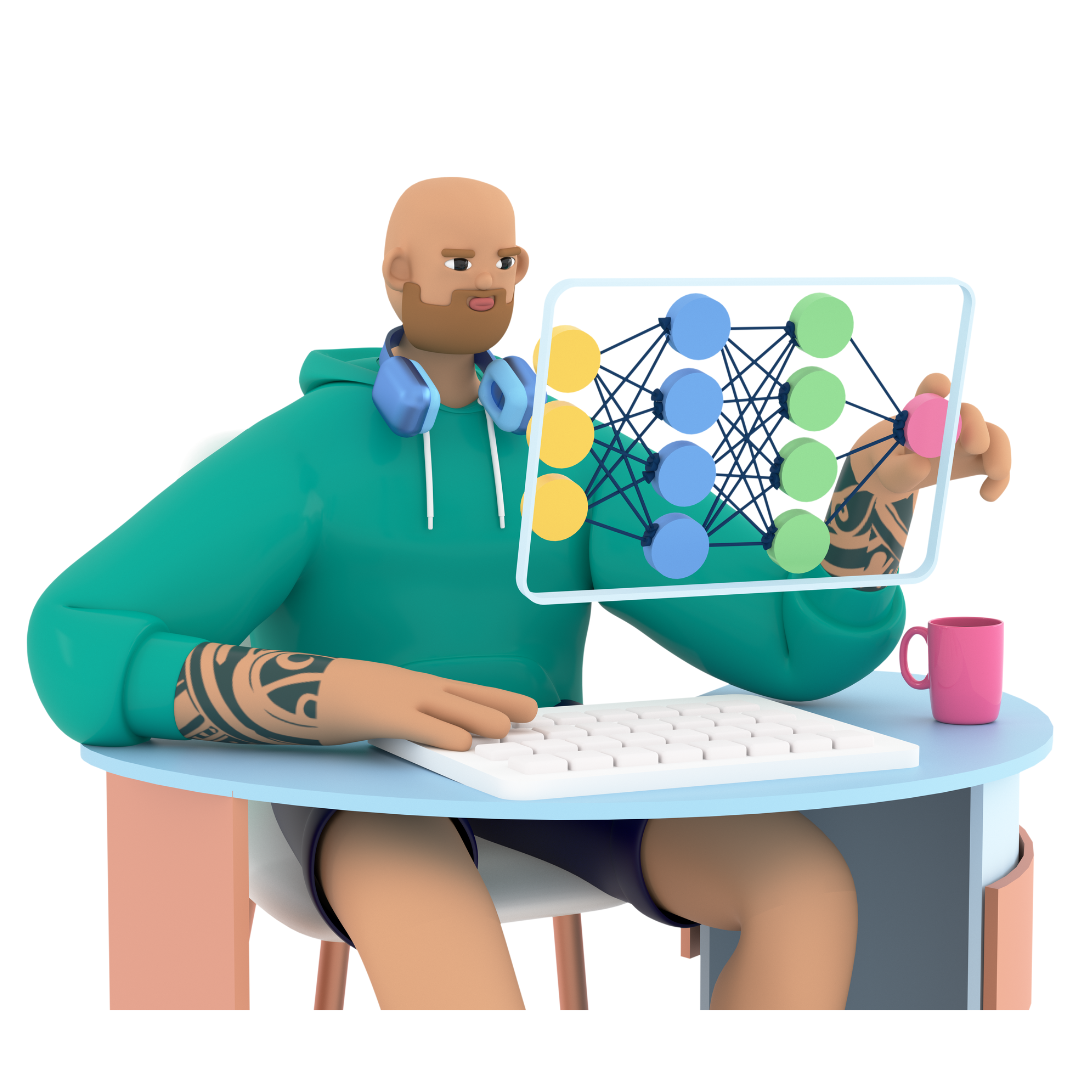Do My Convolutional Neural Network Assignment | Homework Help
If you want to become proficient in computer vision and deep learning, you're in the right spot. Our specialized CNN Assignment Help service is designed to support students in comprehending and excelling in the intricate domain of Convolutional Neural Networks.
CNNs are a fundamental component of modern deep learning, particularly in image and video analysis. However, grasping the intricacies of CNNs can be challenging for students due to their unique architecture and mathematical concepts. That's where our expert assistance comes in.
Our team comprises seasoned professionals with extensive expertise in Convolutional Neural Networks (CNNs) and associated subjects. We offer tailored guidance, guaranteeing that you build a solid understanding of CNNs, starting from the fundamentals and progressing to more advanced methods. Whether you require assistance with image recognition, object detection, or semantic segmentation, we are here to assist you.
Prepare to immerse yourself in the realm of Convolutional Neural Networks with assurance. Our CNN Assignment Help service is here to assist you throughout your academic path and set the stage for your triumph in computer vision and deep learning. Let's embark on this thrilling learning journey together!
What is Convolutional Neural Network (CNN)?
A Convolutional Neural Network (CNN) is a distinct form of artificial neural network primarily engineered to analyze images and videos. These networks derive their structure from the human visual system, processing visual data through layered neurons hierarchically. Similarly, CNNs use layers of interconnected neurons to automatically learn and extract features from images, making them highly effective in recognizing patterns and objects.
The key components of a CNN include:
- Convolutional Layers: These layers utilize filters, also known as kernels, to process the input image, detecting crucial features such as edges, corners, or textures. During training, the filters are learned, enabling the network to adapt to different patterns in diverse images.
- Activation Functions: After the convolution, activation functions introduce non-linearity to the network. Popular activation functions like ReLU (Rectified Linear Unit) help in capturing complex relationships and enable the network to learn more efficiently.
- Pooling Layers: Pooling layers down sample the feature maps obtained from convolutional layers, reducing computational complexity and retaining essential information.
- Fully Connected Layers: These layers generate the CNN's output and are accountable for the final classification or regression tasks based on the learned features.
Why Convolutional Neural Network (CNN) Assignment is Challenging?
The Convolutional Neural Network (CNN) assignments can be challenging due to several factors that require specialized knowledge and skills. Here are some of the key challenges faced by students when dealing with CNN assignments:
- Complex Architecture: CNNs consist of multiple layers with interconnected neurons, making their architecture intricate. Understanding the flow of data and the functionality of each layer, such as convolution, activation, and pooling, demands a deep comprehension of neural network principles.
- Hyperparameter Tuning: CNNs involve tuning various hyperparameters, like learning rates, batch sizes, and filter sizes. Selecting appropriate values for these hyperparameters is crucial for achieving optimal performance, and it requires extensive experimentation and knowledge of the data and problem domain.
- Overfitting and Regularization: CNNs are prone to overfitting, where the model performs well on training data but poorly on unseen data. Implementing regularization techniques like dropout and weight decay to prevent overfitting necessitates a profound understanding of regularization methods.
- Large Dataset Requirement: CNNs typically require a large dataset for effective training. Obtaining and preparing such datasets can be time-consuming and challenging, especially in specialized domains.
- Computationally Intensive: Training CNNs is computationally demanding, especially for complex architectures and large datasets. Dealing with limited computational resources can pose challenges and may require optimization strategies.
- Transfer Learning and Fine-Tuning: Applying transfer learning or fine-tuning pre-trained CNN models for specific tasks demands expertise in model adaptation and parameter adjustments.
What are the types of Convolutional Neural Network (CNN)?
Convolutional Neural Networks (CNNs) are available in diverse types, each uniquely designed to handle distinct tasks within the domains of computer vision and image analysis. Below are the primary variants of CNNs:
- Standard CNN: Standard CNN is the fundamental CNN structure comprising multiple convolutional layers, pooling layers, and fully connected layers. It's primarily utilized for image classification tasks involving single-object inputs.
- Siamese CNN: Siamese CNNs are used for tasks like image similarity and object tracking. They consist of two identical subnetworks, each processing different input images, and their outputs are compared to establish similarity or dissimilarity.
- Region-based CNN (R-CNN): R-CNN is used for object detection tasks, where it first generates region proposals and then classifies objects within those regions. Fast R-CNN and Faster R-CNN are variations that improve speed and accuracy.
- U-Net: The U-Net architecture is specifically designed for image segmentation tasks, aimed at precisely identifying and labeling various regions or objects present within an image. It consists of a contracting path, which captures features, and an expansive path for precise localization.
- DeepLab: DeepLab is another type of CNN used for semantic image segmentation. It incorporates dilated convolutions to capture multi-scale contextual information effectively.
- ResNet: Residual Networks (ResNet) are deep CNNs that use residual connections to mitigate the vanishing gradient problem. They allow for training deeper networks and are widely used for various computer vision tasks.
- VGGNet: VGGNet is recognized for its simplicity, utilizing multiple layers with smaller convolutional filters. It is used in image recognition and classification tasks.
Applications of Convolutional Neural Network (CNN)
Convolutional Neural Networks (CNNs) have significantly transformed computer vision and image processing by exhibiting exceptional performance across multiple practical applications Some of the key applications of CNNs are:
- Image Recognition: CNNs excel in image recognition tasks, accurately identifying objects, scenes, and patterns within images. These networks find extensive applications in facial recognition, object detection, and image classification systems, contributing to advancements in security, surveillance, and biometric technologies
- Autonomous Vehicles: Convolutional Neural Networks (CNNs) significantly contribute to the advancement of autonomous vehicle technology. They assist in recognizing traffic signs, pedestrians, and other vehicles, enhancing the safety and efficiency of self-driving cars.
- Medical Imaging: Convolutional Neural Networks (CNNs) exhibit remarkable proficiency in medical image analysis, significantly aiding in diagnosing and treating diverse medical conditions. They're pivotal in detecting anomalies in medical imaging technologies such as X-rays, MRI scans, and CT scans, assisting healthcare practitioners in precise and prompt diagnoses.
- Natural Language Processing: CNNs find application in various natural language processing tasks, including sentiment analysis, language translation, and speech recognition. They contribute significantly to understanding and processing textual data, thereby enabling the development of more sophisticated and effective language-based applications.
- Video Analysis: CNNs are employed in video analysis applications, including action recognition, video surveillance, and video content understanding. They can identify and track objects and activities in videos, facilitating improved security and video content categorization.
- Art and Creativity: CNNs have been utilized in creative fields, such as art and design. They can generate artistic styles and transform images into artistic masterpieces, adding a unique dimension to creative expression.
- Environmental Monitoring: CNNs are used for environmental monitoring tasks, such as satellite image analysis and weather forecasting. They aid in analyzing large datasets and identifying patterns related to climate change and natural disasters.
Topics Covered by our Convolutional Neural Network (CNN) Assignment Help Service
Our Convolutional Neural Network (CNN) Assignment Help Service covers a comprehensive range of topics to aid students in mastering the concepts and applications of CNNs. Some of the key topics covered by our service include:
- CNN Architecture: Understanding the fundamental architecture of CNNs involves exploring key components such as convolutional layers, pooling layers, and fully connected layers.
- Filter Kernels: Learning about filter kernels and their role in feature extraction from input images.
- Activation Functions: Exploring various activation functions used in CNNs, such as ReLU, Sigmoid, and Tanh.
- Training and Optimization: Understanding the process of training CNNs using backpropagation and optimization algorithms like Gradient Descent and Adam.
- Transfer Learning: Learning how to leverage pre-trained CNN models for new tasks and domains.
- Object Detection: Understanding techniques for object detection using CNNs, such as YOLO (You Only Look Once) and SSD (Single Shot Multibox Detector).
- Image Segmentation: Exploring methods for image segmentation using CNNs, like U-Net and Mask R-CNN.
- Fine-tuning: Learning the art of fine-tuning CNN models to enhance their performance on particular tasks.
- Convolutional Autoencoders: Grasping the concept of convolutional autoencoders and how they are applied in tasks like image compression and denoising.
- Adversarial Attacks: Exploring techniques for generating adversarial examples to assess the robustness of CNNs.
Why choose our Convolutional Neural Network (CNN) Assignment Help Service?
Choosing our Convolutional Neural Network (CNN) Assignment Help Service offers students numerous advantages, making it the ideal choice for academic support in the field of CNNs.
- The Python Assignment Help Service has a team of Convolutional Neural Networks experts to support students with assignments, homework and projects. They possess a deep understanding of CNN concepts, architectures, and applications, ensuring accurate and reliable solutions to your assignments.
- Students may be juggling multiple assignments, making it difficult to dedicate the necessary time to complete their CNN assignments. Our Python tutors can guide you to complete the CNN assignment faster and get the desired output.
- We have successfully solved 2369+ assignments on challenging CNN topics, such as image classification or natural language processing. Thus making us one of the best assignment help providers online.
- We provide competitive rates to ensure everyone can afford our online assignment help and tutoring services
If you are a student struggling to complete your CNN assignments, our CNN experts can provide you with the help you need to succeed in your coursework.






 Certified Python Experts
Certified Python Experts
 4.7/5.0
4.7/5.0 4.3/5.0
4.3/5.0 4.5/5.0
4.5/5.0





